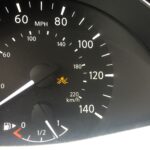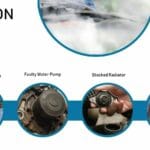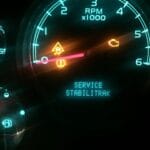Experiencing vibrations when you hit the gas? This instructional guide will help you diagnose and understand why your car shakes when accelerating, from simple tire pressure checks to more complex issues like CV joints and engine mounts. We’ll help you determine if it’s a quick DIY fix or a job for a professional mechanic. Let’s get your car running smooth again!
Is It Your Wheels?
First, let’s investigate the most common culprits: your wheels and tires. Problems here are often the easiest to fix.
Tire Troubles
- Tire Pressure: Under-inflated tires are a common cause of vibrations, especially at higher speeds. Use a tire gauge to check the pressure in all four tires, comparing it to the recommended pressure in your owner’s manual or on the driver’s side doorjamb. [https://www.lolaapp.com/] Proper inflation ensures a smoother, safer ride.
- Loose Lug Nuts: Loose lug nuts can cause a noticeable wobble that intensifies when accelerating. This is a serious safety concern! Tighten them with a lug wrench, ensuring they are snug. [https://www.lolaapp.com/] This easy DIY fix can prevent a potential disaster.
- Worn or Unbalanced Tires: Tires wear down over time, and uneven wear or imbalance can cause vibrations. Visually inspect your tires for wear patterns, bulges, or embedded objects. Getting your tires balanced or replaced by a professional [https://www.lolaapp.com/] is a worthwhile investment.
Steering and Suspension
Beyond tires, worn components in your steering and suspension system can also cause vibrations. Worn ball joints, tie rod ends, control arms, and shock absorbers can create shakes and shimmies. It’s best to consult a mechanic [https://www.lolaapp.com/] to pinpoint issues in this area.
Digging Deeper: Drivetrain Issues
If your wheels check out, the problem might be in your drivetrain—the system that transfers power from the engine to the wheels.
CV Joints and Driveshafts
- CV Joints: Worn CV joints commonly produce clicking sounds and vibrations, especially when turning or accelerating. [https://www.lolaapp.com/] A torn CV boot allows grease to escape, leading to joint wear.
- Driveshaft/Axle: A bent or damaged driveshaft can cause significant vibrations, especially at higher speeds. This issue is often due to impacts (like hitting a pothole) and requires professional repair. [https://www.lolaapp.com/]
The Heart of the Matter: Engine Problems
Sometimes, the shaking originates from your engine.
Engine Troubles
- Misfiring Engine: A misfiring engine can shake noticeably, especially when accelerating. This can be caused by faulty components like spark plugs, ignition coils, or fuel injectors. Replaceable sparkplugs [https://www.lolaapp.com/]
- Motor Mounts: Worn motor mounts allow excessive engine movement, leading to vibrations you’ll feel throughout the car. [https://www.lolaapp.com/] Replacing motor mounts is best left to a professional.
Other Potential Culprits
A few other less common issues can cause vibrations.
Brakes and Transmission
- Sticking Brake Calipers: A sticking caliper can cause vibrations, usually accompanied by a burning smell and pulling to one side.
- Transmission Issues: While less frequent, transmission problems might manifest as vibrations, particularly during acceleration. Diagnosing transmission issues typically requires a skilled technician.
Troubleshooting Your Shaky Car
- Start Simple: Check tire pressure, lug nuts, and visually inspect your tires.
- Listen Up: Pay attention to any accompanying noises (like clicking).
- Feel the Vibration: Where do you feel it most? Steering wheel, seat, or whole car?
- When Does It Happen?: Note when the vibrations occur (e.g., during acceleration, braking, at specific speeds).
- DIY or Pro?: Determine if it’s a simple fix you can handle or if you need a mechanic. [https://www.lolaapp.com/]
Is Your Vibrating Car Safe to Drive? A Mechanic’s Guide to Diagnosis & Risks
Driving a slightly vibrating car might be okay temporarily, but ignoring any vibration can lead to more serious problems. A thorough inspection is crucial for identifying the cause and ensuring your safety.
Locating the Source
- Steering Wheel Shakes: Likely tire problems, steering, or suspension issues. [https://www.lolaapp.com/]
- Seat Trembles: Suggests drivetrain problems like worn CV joints or a damaged driveshaft.
- Whole-Car Vibrations: Could be tires, engine mounts, or transmission issues. [https://www.lolaapp.com/]
When It Happens Matters
- Vibrations While Idling: Often points to engine-related issues like worn motor mounts.
- Vibrations During Acceleration: Consider CV joints, engine mounts, or unbalanced tires.
- Vibrations While Braking: Probably warped rotors. [https://www.lolaapp.com/]
- Speed-Dependent Vibrations: Indicates potential problems with tires or the driveshaft. [https://www.lolaapp.com/]
Ignoring vibrations can worsen the underlying problem, leading to costly repairs and potential safety hazards. Consult a qualified mechanic [https://www.lolaapp.com/] for proper diagnosis and repair.
Why Is My Engine Shaking and Vibrating?
Engine vibrations often signal issues stemming from your wheels, tires, drivetrain, or the engine itself. Addressing these promptly is essential.
Simple Checks
- Unbalanced Tires: Cause noticeable vibrations, especially at higher speeds. [https://www.lolaapp.com/]
- Loose Lug Nuts: Create a wobble that worsens with acceleration, presenting a safety risk. [https://www.lolaapp.com/] Improperly tightened lug nuts can lead to wheel detachment. Regular checks are vital.
Drivetrain Concerns
- Worn CV Joints: Produce clicking sounds and vibrations, especially when turning or accelerating. [https://www.lolaapp.com/]
- Damaged Driveshaft: Causes severe vibrations, particularly at higher speeds. Ignoring this can be dangerous. [https://www.lolaapp.com/]
Engine Issues
- Misfiring Engine: Causes noticeable shaking, rough idling, and reduced power. [https://www.lolaapp.com/] Prompt diagnosis is essential to prevent further damage.
- Broken Motor Mounts: Lead to excessive engine movement and noticeable vibrations. [https://www.lolaapp.com/] Consult a mechanic immediately if you suspect this issue.
Other Possibilities
- **Internal Transmission Issues: Though less common, transmission problems can cause vibrations during acceleration. These require professional expertise.
- Sticking Brake Calipers: Can cause vibrations accompanied by overheating and a burning smell. Ignoring this could lead to brake failure.
- Crankshaft Damage: A severe issue causing substantial vibrations. Immediate attention is required.
Troubleshooting Engine Vibrations
- Visual Inspection: Check tires for wear, bulges, or damage. Examine the undercarriage for loose components.
- Test Drive: Pay attention to when the vibrations occur. Note specific speeds, acceleration levels, turns, and braking.
- Professional Help: Consult a qualified mechanic for diagnostics if the issue isn’t readily apparent.
Remember, delve into the captivating life story of Brent Varnorman and uncover the hidden gems of Coffeeville, MS.















